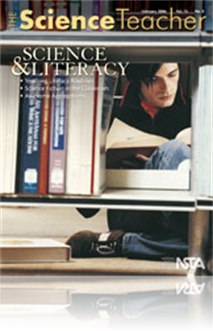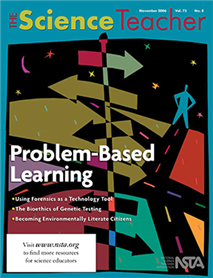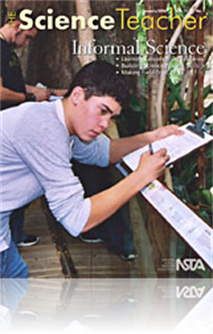All The Science Teacher resources
Journal Article
Science is a vocabulary-rich subject and students' knowledge of vocabulary relates directly to their comprehension. That is why it is important to provide a variety of opportunities for students to practice vocabulary. In this inquiry-based activity,...
Journal Article
Investigating an Aerial Image First
Conventional instructional routines used to introduce optics concepts can be ineffective at developing an in-depth conceptual understanding that allows students to apply optics concepts to simple, but real, optical systems. To correct this proble...
Journal Article
How can we use inquiry to examine why animals live in groups? The answer is to use models, which are more feasible than working with hundreds of test subjects. This article describes a Standards-based directed inquiry into overwintering biology and b...
Journal Article
Enabling All Students to Learn Science
Communicating with students in today's high school science classroom is challenging for teachers because the majority of them speak only English. Many of their students, however, do not speak English as their primary language. One way to bridge the g...
Journal Article
Ask the Experts -- February 2006
In this month's Ask the Experts column, the following questions are addressed, "Why does the Moon show phases when viewed from Earth, but Earth always looks the same from the Moon, with only the top half illuminated?" and "Why are there two tides per...
Journal Article
Science Fiction & Science Literacy
Science fiction is read not only for enjoyment, but because it digs into scientific concepts with imagination, creativity, and a thorough appreciation of consequence. It has so much to offer in terms of good science and how science works, while at th...
Journal Article
Literacy in Science: A Natural Fit
Reading is an essential part of science literacy, but what, when, and how can we incorporate reading in the science classroom? To address these questions and bring reading back into the science classroom, the authors designed four inquiry-based, quar...
Journal Article
Editor's Corner - Science Literacy: Then and Now
The history of science is also a history of science writing. For scientists and also for our science students, the ability to communicate through writing and reading is a crucial skill at the heart of developing scientific literacy. In this month's ...
Journal Article
Teachers are familiar with dozens of high school physics activities involving eggs. In this egg-related activity, students design and construct “Egg Racers” to learn problem-solving, physics, and engineering skills. Students will have fun with th...
Journal Article
A school field trip tries to bring the structure and order of a formal classroom setting into an unstructured place where visitors (learners) typically choose what they want to do. In order to address this conflict, several strategies exist to help t...
Journal Article
Ask the Experts -- January 2006
Have you ever wondered why lead is considered to be a cancerous metal? One of our "Ask the Experts" readers was also curious about this subject and posed this question to our Experts: "They say lead is a very cancerous metal. How come? Other metals a...




